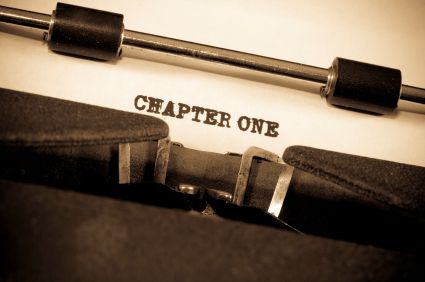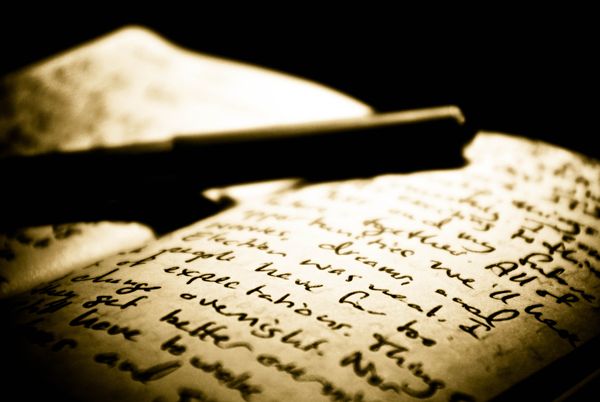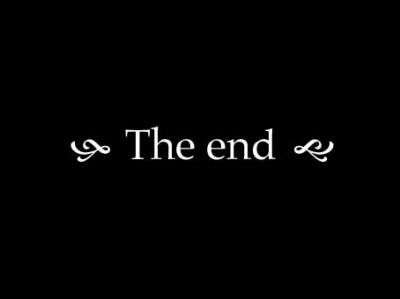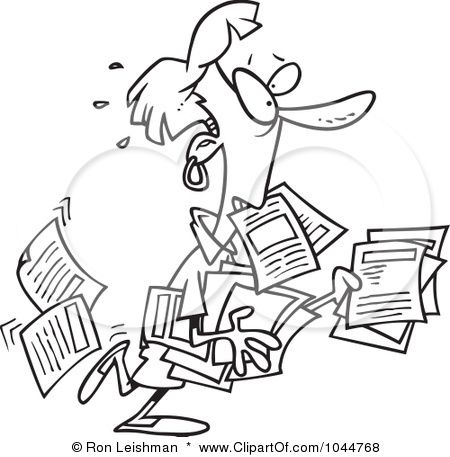I'm always interested in learning the idiosyncrasies of writers. Some of the things we do make people scratch their heads in confusion or shrug their shoulders......even look at us like we're crazy. That's my favorite reaction, makes me giggle.
Some writers need to have everything set up just right before they can begin writing; we like complete silence or, in some cases, music playing to inspire and/or relax us; some who write longhand have to use a specific pen/pencil when writing. (I fall under this category.) The list goes on and on...
What's the point to all of this rambling? This, writers operate and think in ways that don't necessarily fall under what would be considered "normal" behavior. (Who wants to be normal? Boring!) One of our odd little quirks is where we begin writing our stories. Not all novels are written in order: beginning, middle, end. Let's have a look at the possibilities.
--The Beginning--
The beginning is where a large majority of writers start their work. It seems the most logical place to do so, right? Sure it does. You get a good flow with your story when you start at the beginning. An event occurs, which has a snowball effect and causes more problems, until everything culminates in the final battle/resolution/whatever. Reading a book and writing a book are two separate, yet similar, paths on the same journey. Granted, as a writer you know more about your characters than any reader ever will. However, you are experiencing the entire journey for the first time when you begin...er, at the beginning. After the introduction of the MC(s) and the conflict(s), there will then follow a sequence of events that take us through to the end. By then we will have, hopefully, fallen in love with the characters, both good and bad. Yes, even the bad guys.
Reading a book and writing a book are two separate, yet similar, paths on the same journey. Granted, as a writer you know more about your characters than any reader ever will. However, you are experiencing the entire journey for the first time when you begin...er, at the beginning. After the introduction of the MC(s) and the conflict(s), there will then follow a sequence of events that take us through to the end. By then we will have, hopefully, fallen in love with the characters, both good and bad. Yes, even the bad guys.
People read books this way, unless they're really weird--or talented--so, it only makes sense for a story to be written this way.
--The Middle--
Next, you have writers that start in the middle of the book, where the plot's really picking up steam. New twists and turns are being revealed and characters are trying to find the right paths to take them to the end. Whether the finished product will be good or bad is yet to be seen. No matter the tale, the middle is where we get to the meat of the story.

At this point, I have a pretty good idea of who I like/don't like; I know what I hope will happen and what I think will happen; I'm involved in the story and probably won't be putting it down until I've completed the journey. (I admit to tossing a book or two after only partially reading them because they were becoming increasingly ridiculous.)
Here's the million dollar question: If you start writing at this place and time in the story, do you have that same sense of familiarity with the MC and their surroundings as with a story started from the very beginning? No...but, you also don't have preconceived notions about what will happen later, based on what you've witnessed along the way.
Writing from the middle of the book can be preferable, to a lot of writers. I've done it myself a time or two and will most likely do it again in the future.
--The End--
Writers have been known to think of the ending of a story before they know how it begins. The last leg of the journey. Who is alive, injured, or dead. Happy ending¹ or no, the writer sees the resolution of the problem before they see the problem itself. (¹I prefer "not happy" or "happy for now" type endings myself, none of that Happily Ever After crap.)

A writer who begins at the end (so hard not to quote HP's snitch message in this part of the post. SO! HARD!), obviously looks at things a little differently than the rest of us. (More confirmation that writers are a unique breed.) Is it even possible for a book to make sense if you read it backwards? Writing one from ending to beginning is a different story, but still comes with its own complications. Also, even though a writer may begin at the end, it doesn't mean they don't have an idea of how the character(s) and/or story should begin. (I really hope that makes sense to someone other than me.)
Starting at the end of a book is a challenge, but it can work, and be well worth it in the long-run. Perhaps it's a good idea to start a story at this point of the journey because it gives the writer a different view of everything.
I open at the close--J.K. Rowling (-- Sorry, but I couldn't resist.)
--Anywhere and Everywhere--
Finally, we have those oddballs--those writing freaks of nature (and I say that in such a loving way)--who have no method to their madness. They are a breed within a breed, creating beauty out of chaos in ways even the oddest of us don't understand.
The biggest obstacle, I would think, is ensuring accuracy within the journey. A writer using this method could, and probably does, jot down notes to keep a timeline of sorts handy. Maybe, maybe not. Without notes, I imagine there would be some discrepancies, but I could be wrong.
Out of the disorganization, these wonderfully wacky writers tell a tale which, perhaps, wouldn't have been so coherent otherwise. They are one of the most intriguing groups in the writing breed.
No matter where an author begins writing their story, at least the story is being told. That's the important thing. Whether or not it's a good story is debatable, but that's another post for another day. (Really, it's already started in my Drafts.) It's no matter to us if the story we write is good or bad. Plain and simple, we love what we do, and wouldn't change it for anything. We wouldn't put ourselves through rejection after rejection if we didn't enjoy this madness.
I love writers. We are a diverse and eclectic group of people that those outside our circle may never truly understand. Writers come complete with superpowers oddities we embrace wholeheartedly and without shame. Maybe more people in the world should be like us......
Nah, it would surely be a sign of the apocalypse if that were to happen. The world would never survive.
Enlighten me fellow freaks, because I want to know, where is your write start point?


